- Home
- Fergus Hume
Madame Midas Page 5
Madame Midas Read online
Page 5
Selina was right in her estimate of Vandeloup, and, logically argued, the case stood thus:—
Some animals of a fine organization have an instinct which warns them to avoid approaching danger.
Woman is one of these finely-organized animals. ERGO—
Let no woman go contrary to her instinct.
CHAPTER V. MAMMON’S TREASURE HOUSE
At the foot of the huge mound of white mulloch which marked the site of the Pactolus Mine was a long zinc-roofed building, which was divided into two compartments. In one of these the miners left their clothes, and put on rough canvas suits before going down, and here also they were searched on coming up in order to see if they had carried away any gold. From this room a long, narrow passage led to the top of the shaft, so that any miner having gold concealed upon him could not throw it away and pick it up afterwards, but had to go right into the searching room from the cage, and could not possibly hide a particle without being found out by the searchers. The other room was the sleeping apartment of such miners as stayed on the premises, for the majority of the men went home to their families when their work was done.
There were three shifts of men on the Pactolus during the twenty- four hours, and each shift worked eight hours at a time—the first going on at midnight and knocking off at eight in the morning, the second commencing at eight and ending at four in the afternoon, and the third starting at four and lasting until midnight again, when the first shift of men began anew.
Consequently, when M. Vandeloup awoke next morning at six o’clock the first shift were not yet up, and some of the miners who had to go on at eight were sleeping heavily in their beds. The sleeping places were berths, ranging along two sides of the room, and divided into upper and lower compartments like those on shipboard.
Gaston having roused himself naturally wanted to see where he was, so rubbing his eyes and yawning he leaned on his elbow and took a leisurely survey of his position.
He saw a rather large room lighted at regular intervals by three square windows, and as these were uncurtained, the cold, searching light of daybreak was slowly stealing through them into the apartment, and all the dusky objects therein were gradually revealing themselves in the still light. He could hear the heavy, monotonous breathing of the men, and the restless turning and tossing of those who could not sleep.
Gaston yawned once or twice, then feeling disinclined for any more sleep, he softly put on his clothes, so as not to awake Pierre, who slept in the berth below, and descending from his sleeping-place groped his way to the door and went out into the cool fragrant morning.
There was a chill wind blowing from the bush, bringing with it a faint aromatic odour, and on glancing downwards he saw that the grass was wet with dew. The dawn was burning redly in the east, and the vivid crimson of the sky put him in mind of that sunset under which he had landed with his companion on the Queensland coast. Suddenly a broad shaft of yellow light broke into the pale pink of the sky, and with a burst of splendour the sun rose slowly into sight from behind the dark bush, and all the delicate workings of the dawn disappeared in the flood of golden light which poured over the landscape.
Vandeloup looked idly at all this beauty with an unobservant eye, being too much occupied with his thoughts to take notice of anything; and it was only when two magpies near him broke into a joyous duet, in which each strove to emulate the other’s mellow notes, that he awoke from his brown study, and began to walk back again to the mine.
‘I must let nothing stand in my way to acquire money,’ he said, musingly; ‘with it one can rule the world; without it—but how trite and bald these well-worn maxims seem! Why do I repeat them, parrot- like, when I see what I have to do so clearly before me? That woman, for instance—I must begin by making her my friend. Bah! she is that already; I saw it in her eyes, which she can’t control as she does her face. Yes, I must make her my friend; my very dear friend—and then—well, to my mind, the world-pivot is a woman. I will spare no one in order to attain my ends—I will make myself my own God, and consider no one but myself, and those who stand in my path must get out of it or run the chance of being crushed. This,’ with a cynical smile, ‘is what some would call the devil’s philosophy; at all events, it is good enough for me.’
He was near the mine by this time, and hearing someone calling to him he looked up, and saw McIntosh walking towards him. There was a stir in the men’s quarters now, and he could see the door was open and several figures were moving briskly about, while a number of others were crossing the fields. The regular beat of the machinery still continued, and the smoke was pouring out thick and black from the tall red chimney, while the wheels were spinning round in the poppet-heads as the mine slowly disgorged the men who had been working all night.
McIntosh came slowly along with his hands in his pockets and a puzzled look on his severe face. He could not make up his mind whether to like or dislike this young man, but Madame Midas had seemed so impressed that he had half made up his mind to dislike him out of a spirit of contradiction.
‘Weemen are sae easy pleased, puir feckless bodies,’ he said to himself, ‘a bonny face is a’ they fash their heads aboot, though the same may be already in the grip of auld Nickyben. Weel, weel, if Madam does fancy the lad—an’ he’s no bad lookin’, I’ll say that— she may just hae her ain way, and I’ll keep my e’e on baith.’
He looked grimly at the young man as he came briskly forward with a gay smile.
‘Ye’re a verra early bird,’ he said, fondling his frill of white hair, and looking keenly at the tall, slim figure of the Frenchman.
‘Case of “must”, my friend,’ returned Vandeloup, coolly; ‘it’s only rich men can afford to be in bed, not poor devils like me.’
‘You’re no muckle like ither folk,’ said the suspicious old Scotchman, with a condemnatory sniff.
‘Of that I am glad,’ retorted Vandeloup, with suavity, as he walked beside him to the men’s quarters. ‘What a horrible thing to be the duplicate of half-a-dozen other men. By the way,’ breaking off into a new subject, ‘Madame Midas is charming.’
‘Aye, aye,’ said Archie, jealously, ‘we ken all aboot they French- fangled way o’ gieing pretty words, and deil a scrap of truth in ony o’ them.’
Gaston was about to protest that he said no more than he felt, which was indeed the truth, but Archie impatiently hurried him off to breakfast at the office, as he declared himself famishing. They made a hearty meal, and, having had a smoke and a talk, prepared to go below.
First of all, they arrayed themselves in underground garments—not grave clothes, though the name is certainly suggestive of the cemetery—which consisted of canvas trousers, heavy boots, blue blouses of a rough woollen material, and a sou’wester each. Thus accoutred, they went along to the foot of the poppet heads, and Archie having opened a door therein, Vandeloup saw the mouth of the shaft yawning dark and gloomy at his feet. As he stood there, gazing at the black hole which seemed to pierce down into the entrails of the earth, he turned round to take one last look at the sun before descending to the nether world.
This is quite a new experience to me,’ he said, as they stepped into the wet iron cage, which had ascended to receive them in answer to Archie’s signal, and now commenced to drop down silently and swiftly into the pitchy darkness. ‘It puts me in mind of Jules Verne’s romances.’
Archie did not reply, for he was too much occupied in lighting his candle to answer, and, moreover, knew nothing about romances, and cared still less. So they went on sliding down noiselessly into the gloom, while the water, falling from all parts of the shaft, kept splashing constantly on the top of the cage and running in little streams over their shoulders.
‘It’s like a nightmare,’ thought the Frenchman, with a nervous shudder, as he saw the wet walls gleaming in the faint light of the candle. ‘Worthy of Dante’s “Inferno”.’
At last they reached the ground, and found themselves in the main chamber, from whence the galleries bra
nched off to east and west.
It was upheld on all sides by heavy wooden supports of bluegum and stringy bark, the scarred surfaces of which made them look like the hieroglyphic pillars in old Egyptian temples. The walls were dripping with damp, and the floor of the chamber, though covered with iron plates, was nearly an inch deep with yellow-looking water, discoloured by the clay of the mine. Two miners in rough canvas clothes were waiting here, and every now and then a trolly laden with wash would roll suddenly out of one of the galleries with a candle fastened in front of it, and would be pushed into the cage and sent up to the puddlers. Round the walls candles fastened to spikes were stuck into the woodwork, and in their yellow glimmer the great drops of water clinging to the roof and sides of the chamber shone like diamonds.
‘Aladdin’s garden,’ observed Vandeloup, gaily, as he lighted his candle at that of Archie’s and went towards the eastern gallery, ‘only the jewels are not substantial enough.’
Archie showed the Frenchman how to carry his candle in the miner’s manner, so that it could not go out, which consisted in holding it low down between the forefinger and third finger, so that the hollow palm of the hand formed a kind of shield; and then Vandeloup, hearing the sound of falling water close to him, asked what it was, whereupon Archie explained it was for ventilating purposes. The water fell the whole height of the mine through a pipe into a bucket, and a few feet above this another pipe was joined at right angles to the first and stretched along the gallery near the roof like a never-ending serpent right to the end of the drive. The air was driven along this by the water, and then, being released from the pipe, returned back through the gallery, so that there was a constant current circulating all through the mine.
As they groped their way slowly along, their feet splashed into pools of yellow clayey water at the sides of the drive, or stumbled over the rough ground and rugged rails laid down for the trollies. All along the gallery, at regular intervals, were posts of stringy bark in a vertical position, while beams of the same were laid horizontally across the top, but so low that Vandeloup had to stoop constantly to prevent himself knocking his head against their irregular projections.
Clinging to these side posts were masses of white fungus, which the miners use to remove discolorations from their hands, and from the roof also it hung like great drifts of snow, agitated with every breath of wind as the keen air, damped and chilled by the underground darkness, rushed past them. Every now and then they would hear a faint rumble in the distance, and Archie would drag his companion to one side while a trolly laden with white, wet-looking wash, and impelled by a runner, would roll past with a roaring and grinding of wheels.
At intervals on each side of the main drive black chasms appeared, which Archie informed his companion were drives put in to test the wash, and as these smaller galleries continued branching off, Vandeloup thought the whole mine resembled nothing so much as a herring-bone.
Being accustomed to the darkness and knowing every inch of the way, the manager moved forward rapidly, and sometimes Vandeloup lagged so far behind that all he could see of his guide was the candle he carried, shining like a pale yellow star in the pitchy darkness. At last McIntosh went into one of the side galleries, and going up an iron ladder fixed to the side of the wall, they came to a second gallery thirty feet above the other, and branching off at right angles.
This was where the wash was to be found, for, as Archie informed Vandeloup, the main drives of a mine were always put down thirty or forty feet below the wash, and then they could work up to the higher levels, the reason of this being that the leads had a downward tendency, and it was necessary for the main drive to be sunk below, as before mentioned, in order to get the proper levels and judge the gutters correctly. At the top of the ladder they found some empty trucks which had delivered their burden into a kind of shoot, through which it fell to the lower level, and there another truck was waiting to take it to the main shaft, from whence it went up to the puddlers.
Archie made Vandeloup get into one of these trucks, and though they were all wet and covered with clay, he was glad to do so, and be smoothly carried along, instead of stumbling over the rails and splashing among the pools of water. Every now and then as they went along there would be a gush of water from the dripping walls, which was taken along in pipes to the main chamber, and from thence pumped out of the mine by a powerful pump, worked by a beam engine, by which means the mine was kept dry.
At last, after they had gone some considerable distance, they saw the dim light of a candle, and heard the dull blows of a pick, then found themselves at the end of the drive, where a miner was working at the wash. The wash wherein the gold is found was exceedingly well defined, and represented a stratified appearance, being sandwiched in between a bed of white pipe-clay and a top layer of brownish earth, interspersed with gravel. Every blow of the pick sent forth showers of sparks in all directions, and as fast as the wash was broken down the runner filled up the trollies with it. After asking the miner about the character of the wash, and testing some himself in a shovel, Archie left the gallery, and going back to the shoot, they descended again to the main drive, and visited several other faces of wash, the journey in each instance being exactly the same in all respects. Each face had a man working at it, sometimes two, and a runner who loaded the trucks, and ran them along to the shoots. In spite of the ventilation, Vandeloup felt as if he was in a Turkish bath, and the heat was in some places very great. At the end of one of the drives McIntosh called Vandeloup, and on going towards him the young man found him seated on a truck with the plan of the mine before him, as he wanted to show him all the ramifications of the workings.
The plan looked more like a map of a city than anything else, with the main drive doing duty as the principal street, and all the little galleries, branching off in endless confusion, looked like the lanes and alleys of a populous town.
‘It’s like the catacombs in Rome,’ said Vandeloup to McIntosh, after he had contemplated the plan for some time; ‘one could easily get lost here.’
‘He micht,’ returned McIntosh, cautiously, ‘if he didna ken a’ aboot the lie of the mine—o’er yonder,’ putting one finger on the plan and pointing with the other to the right of the tunnel; ‘we found a twenty-ounce nugget yesterday, and ain afore that o’ twenty-five, and in the first face we were at twa months ago o’er there,’ pointing to the left, ‘there was yin big ain I ca’d the Villiers nugget, which as ye ken is Madame’s name.’
‘Oh, yes, I know that,’ said Vandeloup, much interested; ‘do you christen all your nuggets?’
‘If they’re big enough,’ replied Archie.
‘Then I hope you will find a hundred-ounce lump of gold, and call it the Vandeloup,’ returned the young man, laughing.
There’s mony a true word spoke in jest, laddie,’ said Archie, gravely; ‘when we get to the Deil’s Lead we may find ain o’ that size.’
‘What do you mean by leads?’ asked Vandeloup, considerably puzzled.
Thereupon Archie opened his mouth, and gave the young man a scientific lecture on mining, the pith of which was as follows:—
‘Did ye no ken,’ said Mr McIntosh, sagaciously, ‘in the auld days—I winna say but what it micht be as far back as the Fa’ o’ Man, may be a wee bit farther—the rains washed a’ the gold fra the taps o’ the hills, where the quartz reefs were, down tae the valleys below, where the rivers ye ken were flowin’. And as the ages went on, an’ nature, under the guidance o’ the Almighty, performed her work, the river bed, wiv a’ its gold, would be covered o’er with anither formation, and then the river, or anither yin, would flow on a new bed, and the precious metal would be washed fra the hills in the same way as I tauld ye of, and the second river bed would be also covered o’er, and sae the same game went on and is still progressin’. Sae when the first miners came doon tae this land of Ophir the gold they got by scratchin’ the tap of the earth was the latest deposit, and when ye gae doon a few hundred feet ye come on the secon
d river—or rather, I should say, the bed o’ the former river-and it is there that the gold is tae be found; and these dried-up rivers we ca’ leads. Noo, laddie, ye ma ken that at present we are in the bed o’ ain o’ these auld streams three hun’red feet frae the tap o’ the earth, and it’s here we get the gold, and as we gae on we follow the wandrin’s o’ the river and lose sight o’ it.’
‘Yes,’ said Vandeloup quickly, ‘but you lost this river you call the Devil’s Lead—how was that?’
‘Weel,’ said Mr McIntosh, deliberately, ‘rivers are varra like human bein’s in the queer twists they take, and the Deil’s Lead seems to hae been ain like that. At present we are on the banks o’ it, where we noo get these nuggets; but ‘tis the bed I want, d’ye ken, the centre, for its there the gold is; losh, man,’ he went on, excitedly, rising to his feet and rolling up the plan, ‘ye dinna ken how rich the Deil’s Lead is; there’s just a fortune in it.”
“I suppose these rivers must stop at a certain depth?”
“Ou, ay,” returned the old Scotchman, “we gae doon an’ doon till we come on what we ma ca’ the primary rock, and under that there is nothin’—except,” with a touch of religious enthusiasm, “maybe ‘tis the bottomless pit, where auld Hornie dwells, as we are tauld in the Screepture; noo let us gae up again, an’ I’ll show ye the puddlers at wark.”
Vandeloup had not the least idea what the puddlers were, but desirous of learning, he followed his guide, who led him into another gallery, which formed a kind of loop, and joined again with the main drive. As Gaston stumbled along, he felt a touch on his shoulder, and on turning, saw it was Pierre, who had been put to work with the other men, and was acting as one of the runners.
“Ah! you are there, my friend,” said Vandeloup, coolly, looking at the uncouth figure before him by the feeble glimmer of his candle; “work away, work away; it’s not very pleasant, but at all events,” in a rapid whisper, “it’s better than New Caledonia.”

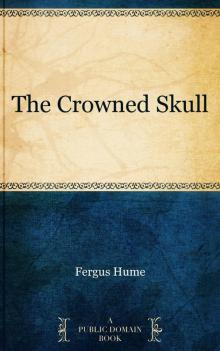 The Crowned Skull
The Crowned Skull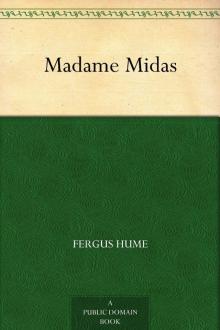 Madame Midas
Madame Midas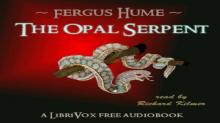 The Opal Serpent
The Opal Serpent The Solitary Farm
The Solitary Farm The Mystery Queen
The Mystery Queen The Bishop's Secret
The Bishop's Secret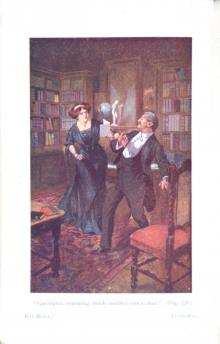 Red Money
Red Money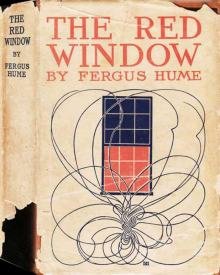 The Red Window
The Red Window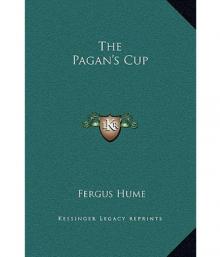 The Pagan's Cup
The Pagan's Cup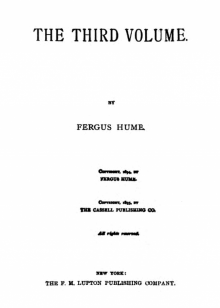 The Third Volume
The Third Volume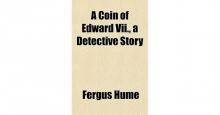 A Coin of Edward VII: A Detective Story
A Coin of Edward VII: A Detective Story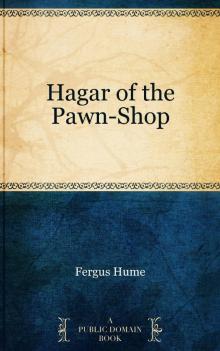 Hagar of the Pawn-Shop
Hagar of the Pawn-Shop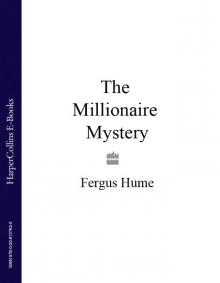 The Millionaire Mystery
The Millionaire Mystery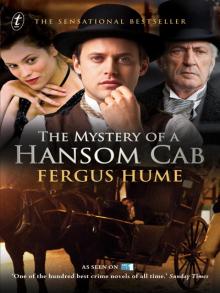 The Mystery of a Hansom Cab
The Mystery of a Hansom Cab